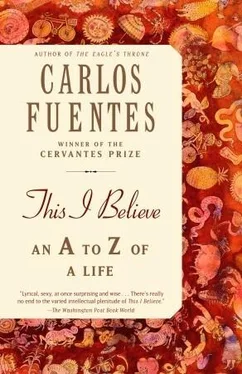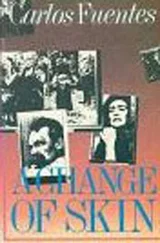We have a proven identity. We know what it is to be Mexican, we know how it unites us and how it divides us. We don’t confuse ourselves with anyone. But we don’t separate ourselves from anyone, either. The search for a national identity — the nation-narration — has left us perplexed for centuries. To think that we do not possess any identity is a pre-Copernican form of living in the universe. It gives us a pretext for not moving forward from the identity we have acquired to the diversity we have yet to conquer. That is where national identity and personal identity become a creative challenge. Let us conquer political, religious, sexual, and cultural diversity. Let us move from identity to diversity through a path of respect. Let us renounce, as Héctor Águilar Camín advises us, the cult of “the legend of the defeated” as our repository of self-admiration.
Nevertheless, we must pay the tithe of risk to achieve courage. In Mexico, risk is the facility with which we move from desperation to optimism, only to fall back into desperation — or grab on to faith, the next life preserver. The PRI dominated us because it was our mirror. Revolutionary, agrarianist, laborist, socialist, nationalist, sectorial, corporativist, developmentist, stabilizer, authoritarian, open, populist, neoliberal. In a succession of reactions to previous inadequacies or failures, we run the risk of throwing out all we have achieved, and surrender only to those things we see as most desirable. Or, more tragically, force ourselves to love only that which is born out of loss and desperation, as if we had a rosary of lost utopias to which we might add our own nostalgic experience. Juárez and Cárdenas were great men because they were men of their time who nevertheless possessed historical memory. Though we may be frightened of the world we live in (and there is plenty to be frightened of), we cannot seek refuge in the nostalgia of singular, spectacular heroicides. Let us choose, instead, to learn lessons and avoid mistakes.
In my books, I have expressed some of the more extreme Mexicanophile faith of certain compatriots, bordering on the “There is only one Mexico” vein. “One does not explain Mexico. One believes in Mexico, with fury, with passion,” as Manuel Zamacona says in La región más transparente ( Where the Air Is Clear ).
I have also given a voice to the disillusion of many Mexicans: “Don’t let yourself get carried away with enthusiasm; in Mexico disappointment is quick to punish people who have faith and take it out onto the street.”
And so I return to the kingdom of small things in Mexico because they are the greatest things. The modesty of an artisan, the pride of a cook. The melancholy of a singer and the cry of a rebel. The discretion of lovers. The beauty, without exception, of all the children of Mexico. The inborn courtesy of good Mexicans. The lasting, imperishable beauty of the loveliest Mexican women. Patience, when it is wise reflection. Impatience, when it is meditated rebellion. Isolated triumphs of the landscape in the midst of an abrupt, impatient, occasionally too leafy, occasionally too sterile natural realm, unattainable in its solar heights, undesirable in its hellish depths (only in the Mictlan mythologies of Mexico is the inframundo, or underworld, both heaven and hell, a flowering inferno). Mexico is the heart of the battle in which the beautiful and the steadfast — art, sculpture, cities, and temples, things built for all eternity — fight the toxic progression of the ugly — garbage, the chaos of the city, the desolation of the countryside. .
My vision of Mexico will always be caught between the enigma of the dawn and the certainty of the dusk, and to tell the truth, I don’t know which is which. Doesn’t each night contain the day that preceded it, and each morning the memory of the night that gave it life?. . For this reason the victories of the human realm are greater in Mexico. Though our reality may be extreme, we do not deny any aspect of it. Rather, we try to integrate them all into the art, the gaze, the taste, the dream, the music, the word. . Mexico as the portrait of a creation that never rests because its work is still unfinished. 3
An incomplete country, Mexico is patient and serene, yet it still harbors the rage of a hope that has been frustrated too many times. This country has waited for centuries, dreaming, for its day in history to finally arrive. Its scowl and its smile have become one. Mexico is tender fortress, cruel compassion, mortal friendship, instantaneous life. All its ages fuse into one — the past that is ahorita— right now — as well as the future ahorita and the present ahorita. No nostalgia, no lethargy, no illusion, no inevitability. A nation of all possible histories, Mexico only asks — with force, with tenderness, with cruelty, with compassion, with fraternity, with life, and with death — for things to happen, for once and for all, now, that already that is a sigh, an exclamation, an epitaph and a convocation, all at the same time: I’m coming. Enough is enough. He’s already dead. Let’s get together already. It is my history, not yesterday’s nor tomorrow’s, and I want my eternal time to come today, I want love today, paradise and inferno, life and death, today, I’m tired of all the disguises, accept me as I am, for our wounds and our scars, your tears and your smile, my flower and my dagger are inseparable. Nobody has waited as long, nobody has battled so fiercely against the inevitability, passivity, ignorance that others have invoked to condemn it, as this nation of survivors that should have died a natural death after all the injustice, all the lies, and all the scorn its oppressors have heaped upon its aching body, the aching body of Mexico. Through many millennia of suffering and rejection, of oppression, so many centuries of unconquerable defeat, Mexico has risen, time and again, from its own ashes. Until when? What will be the time limit of our next great hope? What shall be the intensity of our next great desire?
What can the novel say that cannot be said in any other manner? This is the very radical question asked by Hermann Broch. It is answered, specifically, by a constellation of novelists so extensive and so diverse that together they offer a newer, broader, and even more literal notion of the dream of Weltliteratur, the world literature that Goethe envisioned. If, as French critic and novelist Roger Caillois said, the first half of the nineteenth century belonged to European literature, then the second half belonged to the Russians, while the first half of the twentieth century belonged to the North Americans, and the second half to the Latin Americans. Then, at the dawn of the twenty-first century, we can speak of a universal novel that encompasses Günter Grass, Juan Goytisolo, and José Saramago in Europe; Susan Sontag, William Styron, and Philip Roth in North America; Gabriel García Márquez, Nélida Piñón, and Mario Vargas Llosa in Latin America; Kenzaburo Oe in Japan; Anita Desai in India; Naguib Mahfouz and Tahar Ben-Jeleum in North Africa; and Nadine Gordimer, J. M. Coetzee, and Athol Fugard in South Africa. Nigeria alone, from the “heart of darkness” of the shortsighted Eurocentric conceptions, has three great narrators: Wole Soyinka, Chinua Achebe, and Ben Okri.
What is it that unifies these great novelists beyond their respective nationalities? Two things that are essential to the novel. . and society. Imagination and language. They answer the question of what distinguishes the novel from journalistic, scientific, political, economic, and even philosophical inquiry. They give verbal reality to that part of the world that is unwritten. And they all share the urgent fear of all authors of literature: if I don’t put this word down on paper, nobody else will. If I don’t utter this word, the world will fall into silence (or gossip and fury). And a word unwritten or unspoken condemns us all to die mute and discontent. Only that which is spoken is sacred; unspoken, unsacred. By saying something, the novel makes visible the invisible aspect of our reality. And it does so in a manner that is entirely unforeseeable by the realistic or psychological canons of the past. To the full (plenipotentiary) manner of Bakhtin, the novelist employs fiction like an arena in which characters appear along with language, codes of conduct, the most remote historical moments, and multiple genres, causing artificial walls to crumble, endlessly broadening the territory of human presence in history. The novel ultimately reappropriates the very thing that it is not: science, journalism, philosophy. .
Читать дальше












